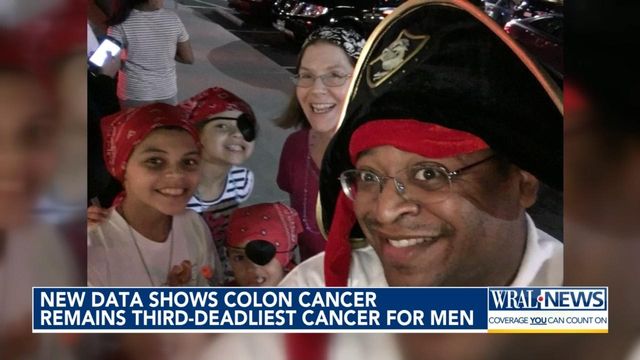New data shows colon cancer remains among deadliest cancers in U.S., warning signs one survivor says saved his life
The latest annual report from the American Cancer Society shows colon cancer is once again the third-deadliest cancer in the U.S.
Nearly 53,000 North Carolinians died from colon cancer in 2021, according to the most recent data included in the study.
One of those who knows the shock of a diagnosis is Tristan Evans.
“Every once in a while I’d get this sharp shooting pain in my abdomen and in my lower extremities,” Evans recalled. “I kind of brushed it off and thought maybe it was just my body getting over.”
When his symptoms got worse, Evans went to see a doctor. What he thought were just normal pains, turned out to be several polyps and two tumors.
“My eyebrows were just like, what? I was like what are you talking about!” he said. “They found out it was stage three colon cancer.”
Evans was told he’d likely lose most of his large intestine. With no known family history of the disease, Evans said “it was a gut punch.”
Even more unexpected was receiving the diagnosis at 42, three years before African Americans with his background are even recommended to begin colonoscopies. Those of average risk aren’t recommended to begin screenings until 45.
Evans said he immediately thought of his family. At the time, he and his wife had three children: two toddlers and a six-month-old.
As a Black man, Evans was 40% more likely to die from colon cancer than other races.
Thankfully, after several weeks of radiation and months of chemotherapy, Evans survived.
He now works as a volunteer health ambassador with the Duke Cancer Institute. He shares his story to advocate for increased screenings, especially among minority populations.
“For minorities, we also have another mentality too that we’re hardworking people, we’re going to work through this, a little bit of pain, ‘Oh that’s nothing, we’ll walk it off.’ But no, when your body is telling you something’s not right, especially nowadays, talk to your doctor,” he said.
After his diagnosis, Evans said several of his family members went to be tested and some also found polyps which needed to be removed. He now hopes others will use his story as a warning of why you need to pay attention to the warning signs your body is giving you.
“If we hadn’t gone to the doctor… I didn’t have three years to wait,” he warned.
According to the CDC, common early symptoms of colon cancer can include: changes in bowel habits, bloody stool, diarrhea, abdominal pain or aches and unexplained weight loss. If you experience any of these symptoms, contact your healthcare provider.










